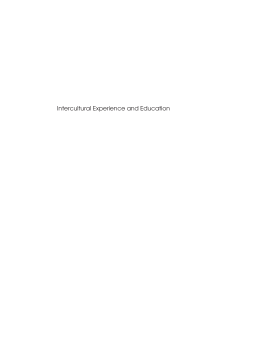
BOOK
Intercultural Experience and Education
Dr. Geof Alred | Prof. Michael Byram | Dr. Mike Fleming
(2002)
Additional Information
Book Details
Abstract
This edited volume explores the educational significance of intercultural experience. It offers a broader conception of interculturality than commonly found in the area of foreign language teaching. Contributors represent a diverse range of academic and professional interests. The aim of the book is to encourage dialogue and interchange across this range, and beyond, to stimulate thinking about the educational value of intercultural experience.
This edited volume provides rich and engaging accounts of being “intercultural” and offers pedagogical insights into intercultural education in a variety of contexts.
Jeeoweon Shin
The editors are all members of the School of Education, University of Durham, interested in interdisciplinary approaches to intercultural experience. Geof Alred is a counsellor and counsellor trainer. His research interests include language in therapy, mentoring, and intercultural experience, in particular student residence abroad.
Mike Byram studied languages and literature before becoming interested in the intercultural dimension of language education and ultimately in educational experience beyond the classroom.
Mike Fleming is Director of Initial Teacher Training. His research interests include the teaching of English and drama and in particular the use of drama as a form of intercultural education.
This book is recommended for learners, professionals and researchers in the fields of intercultural communication and language education as well as the wider academic area of cultural studies.
Masakazu Iino
The book in its entirety, as well as selections of chapters, is appropriate reading for undergraduate and graduate courses, as well as teacher education programmes.
Carla Chamberlain Quinlisk
Table of Contents
| Section Title | Page | Action | Price |
|---|---|---|---|
| Contents | v | ||
| Foreword | vii | ||
| Series Editors’ Preface | x | ||
| Contributors’ Biographical Notes | xii | ||
| Chapter 1 Introduction | 1 | ||
| Chapter 2 Becoming a ‘Better Stranger’: A Therapeutic Perspective on Intercultural Experience and/as Education | 14 | ||
| Chapter 3 For a Flexible Model of Intercultural Understanding | 31 | ||
| Chapter 4 On Being ‘Bicultural’ and ‘Intercultural’ | 50 | ||
| Chapter 5 Learning To Be Intercultural | 67 | ||
| Chapter 6 Intercultural Experience and Drama | 87 | ||
| Chapter 7 An Experience of Interculturality: Student Travellers Abroad | 101 | ||
| Chapter 8 Ethnography and Cultural Practice: Ways of Learning During Residence Abroad | 114 | ||
| Chapter 9 Searching for the Intercultural Person | 131 | ||
| Chapter 10 Changing the Focus: A Discussion of the Dynamics of the Intercultural Experience | 155 | ||
| Chapter 11 English for the English: An Intercultural Approach | 179 | ||
| Chapter 12 A Framework for Teaching and Learning ‘Intercultural Competence’ | 196 | ||
| Chapter 13 The Recognition of Intercultural Competences: From Individual Experience to Certification | 213 | ||
| Afterword What Does it Mean to be Intercultural? | 225 | ||
| Index | 240 |
